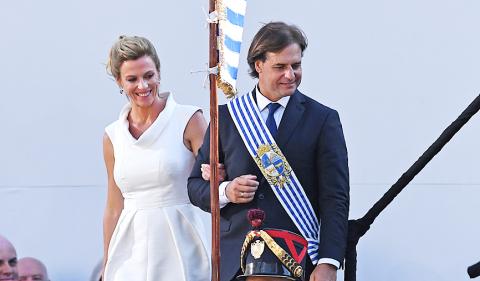Luis Lacalle Pou took office in Uruguay on Sunday, promising to crack down on crime and tighten government finances.
Lacalle Pou, a 46-year-old surfing enthusiast and son of a former president, narrowly won election in November last year in his second try for the office.
He was sworn in by former Uruguayan president Jose Mujica, the senator who received the most votes in the elections.

Photo: AFP
Lacalle Pou inherits a country of nearly 3.4 million people that had grown steadily under the outgoing Broad Front government, but rising crime in recent years dented its popularity and economists have grown concerned about a rising fiscal deficit that reached 4.9 percent of GDP last year.
In his inaugural address, the new leader promised “to promote what was done well [and] correct what was done badly.”
Lacalle Pou, who has promised to cap government spending, said he wanted reduce the costs of production and services “to recover national competitiveness.”
The country faces “an emergency” of insecurity, he said, adding that “the enormous majority of Uruguayans feel unprotected.”
He campaigned on calls to bolster the country’s security forces and toughen sentencing.
“In the interior of the country we used to sleep with the door open... Even vehicles were left with doors and windows open and the key in the ignition, but lately the houses are all fenced,” said Natalia Cardozo, a 37-year-old teacher who was participating on horseback in the inaugural day parade. “We hope that this government takes some measures and can change that.”
Lacalle Pou, who spent many years in the Uruguayan Congress, grew up in an intensely political family. His father, Luis Lacalle Herrera, was president from 1990 to 1995 and his mother, Julia Pou, was a senator. His great-grandfather Luis Alberto de Herrera was a major figure in the National Party.
He will have to depend on an ideologically diverse four-party coalition to get his programs through Congress.

POLITICAL PRISONERS VS DEPORTEES: Venezuela’s prosecutor’s office slammed the call by El Salvador’s leader, accusing him of crimes against humanity Salvadoran President Nayib Bukele on Sunday proposed carrying out a prisoner swap with Venezuela, suggesting he would exchange Venezuelan deportees from the US his government has kept imprisoned for what he called “political prisoners” in Venezuela. In a post on X, directed at Venezuelan President Nicolas Maduro, Bukele listed off a number of family members of high-level opposition figures in Venezuela, journalists and activists detained during the South American government’s electoral crackdown last year. “The only reason they are imprisoned is for having opposed you and your electoral fraud,” he wrote to Maduro. “However, I want to propose a humanitarian agreement that

Young women standing idly around a park in Tokyo’s west suggest that a giant statue of Godzilla is not the only attraction for a record number of foreign tourists. Their faces lit by the cold glow of their phones, the women lining Okubo Park are evidence that sex tourism has developed as a dark flipside to the bustling Kabukicho nightlife district. Increasing numbers of foreign men are flocking to the area after seeing videos on social media. One of the women said that the area near Kabukicho, where Godzilla rumbles and belches smoke atop a cinema, has become a “real

‘POINT OF NO RETURN’: The Caribbean nation needs increased international funding and support for a multinational force to help police tackle expanding gang violence The top UN official in Haiti on Monday sounded an alarm to the UN Security Council that escalating gang violence is liable to lead the Caribbean nation to “a point of no return.” Special Representative of the UN Secretary-General for Haiti Maria Isabel Salvador said that “Haiti could face total chaos” without increased funding and support for the operation of the Kenya-led multinational force helping Haiti’s police to tackle the gangs’ expanding violence into areas beyond the capital, Port-Au-Prince. Most recently, gangs seized the city of Mirebalais in central Haiti, and during the attack more than 500 prisoners were freed, she said.

DEMONSTRATIONS: A protester said although she would normally sit back and wait for the next election, she cannot do it this time, adding that ‘we’ve lost too much already’ Thousands of protesters rallied on Saturday in New York, Washington and other cities across the US for a second major round of demonstrations against US President Donald Trump and his hard-line policies. In New York, people gathered outside the city’s main library carrying signs targeting the US president with slogans such as: “No Kings in America” and “Resist Tyranny.” Many took aim at Trump’s deportations of undocumented migrants, chanting: “No ICE [Immigration and Customs Enforcement], no fear, immigrants are welcome here.” In Washington, protesters voiced concern that Trump was threatening long-respected constitutional norms, including the right to due process. The